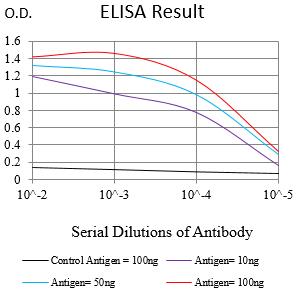
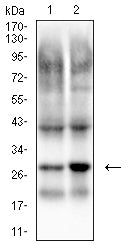
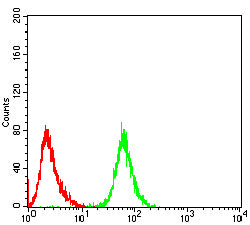
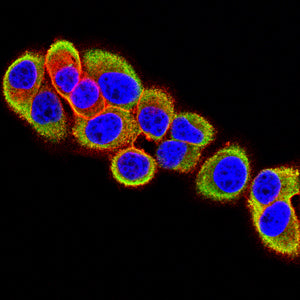
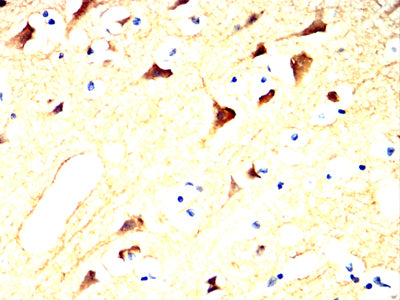
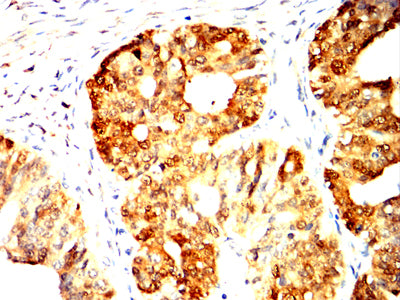
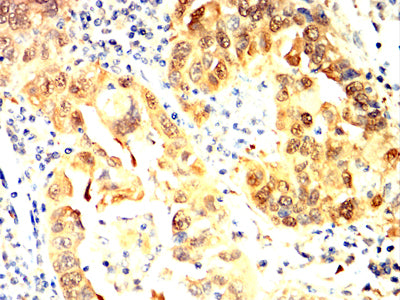
| WB | 1/500 - 1/2000 | Human,Mouse,Rat |
| IF | 咨询技术 | Human,Mouse,Rat |
| IHC | 1/200 - 1/1000 | Human,Mouse,Rat |
| ICC | 1/50 - 1/200 | Human,Mouse,Rat |
| FCM | 1/200 - 1/400 | Human,Mouse,Rat |
| Elisa | 1/10000 | Human,Mouse,Rat |
| Aliases | NDGOA; PARK5; PGP95; SPG79; PGP9.5; Uch-L1; HEL-117; PGP 9.5; HEL-S-53 |
| Entrez GeneID | 7345 |
| clone | 1B4H3 |
| WB Predicted band size | 24.8kDa |
| Host/Isotype | Mouse IgG2b |
| Antibody Type | Primary antibody |
| Storage | Store at 4°C short term. Aliquot and store at -20°C long term. Avoid freeze/thaw cycles. |
| Species Reactivity | Human, Mouse, Rat |
| Immunogen | Purified recombinant fragment of human UCHL1 (AA: 1-220) expressed in E. Coli. |
| Formulation | Purified antibody in PBS with 0.05% sodium azide |
+ +
以下是3-4篇关于UCHL1抗体的参考文献及其简要摘要:
1. **标题**:*UCHL1 (PGP 9.5) is a biomarker for nerve fibers in human tissues*
**作者**:Leroy E, et al.
**摘要**:该研究利用UCHL1抗体在多种神经组织中验证其作为神经纤维特异性标记物的有效性,证实其在帕金森病患者脑部路易体中UCHL1的异常聚集,提示其与神经退行性病变的关联。
2. **标题**:*UCHL1 as a novel diagnostic marker for neuroendocrine tumors*
**作者**:Liu Y, et al.
**摘要**:通过免疫组化实验(使用UCHL1抗体),研究发现UCHL1在小细胞肺癌和神经内分泌肿瘤中高表达,提出其可作为鉴别此类肿瘤的潜在生物标志物。
3. **标题**:*Ubiquitin C-terminal hydrolase L1 regulates tau stability and aggregation*
**作者**:Day INM, et al.
**摘要**:该文献通过Western blot和免疫沉淀(依赖UCHL1抗体)发现,UCHL1通过去泛素化调控tau蛋白稳定性,其功能缺陷可能导致阿尔茨海默病中tau病理沉积。
4. **标题**:*UCHL1 modulates oxidative stress-induced apoptosis in neurons*
**作者**:Hurst-Kennedy J, et al.
**摘要**:研究利用UCHL1抗体检测神经元中该酶的表达变化,发现UCHL1通过清除氧化损伤的泛素化蛋白维持细胞存活,其缺失加剧氧化应激诱发的凋亡。
这些文献均通过UCHL1抗体在疾病模型或临床样本中探讨其功能,涵盖神经退行性疾病、肿瘤诊断及分子机制等领域。
The UCHL1 antibody is a widely used tool in neuroscience and cancer research, targeting ubiquitin carboxyl-terminal hydrolase L1 (UCHL1), a deubiquitinating enzyme encoded by the *UCHL1* gene. UCHL1. also known as PGP9.5. is highly expressed in neurons and neuroendocrine cells, where it regulates protein turnover by cleaving ubiquitin chains to recycle free ubiquitin or modulate protein degradation. Its role in maintaining neuronal integrity has linked it to neurodegenerative disorders, including Alzheimer’s and Parkinson’s diseases, as mutations or altered expression may disrupt proteostasis. UCHL1 is also implicated in cancer, showing elevated levels in lung, colorectal, and pancreatic cancers, where it may promote tumor progression.
Antibodies against UCHL1 serve as biomarkers in diagnostics and research. In pathology, they help identify neuronal tumors (e.g., neuroblastoma) or metastatic lesions of neural origin via immunohistochemistry. In research, these antibodies are employed to study UCHL1’s functional roles in neurodegeneration, synaptic plasticity, and cancer biology. Commercially available clones (e.g., 13C4. 5YF5) vary in specificity for applications like Western blotting, immunofluorescence, or formalin-fixed tissue staining. Notably, UCHL1’s dual role as a tumor promoter or suppressor, depending on context, underscores the importance of antibody validation for accurate experimental interpretation.
×